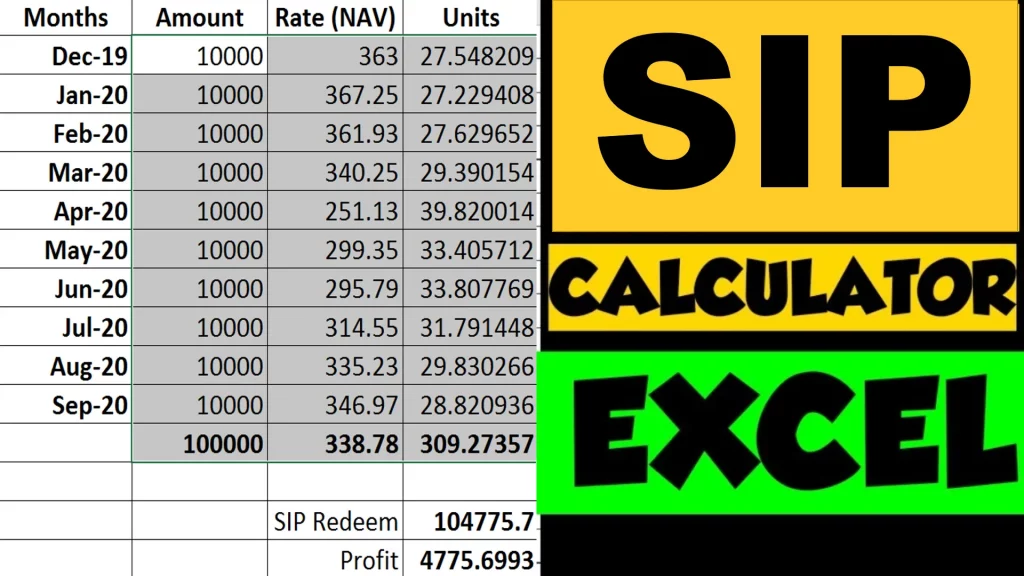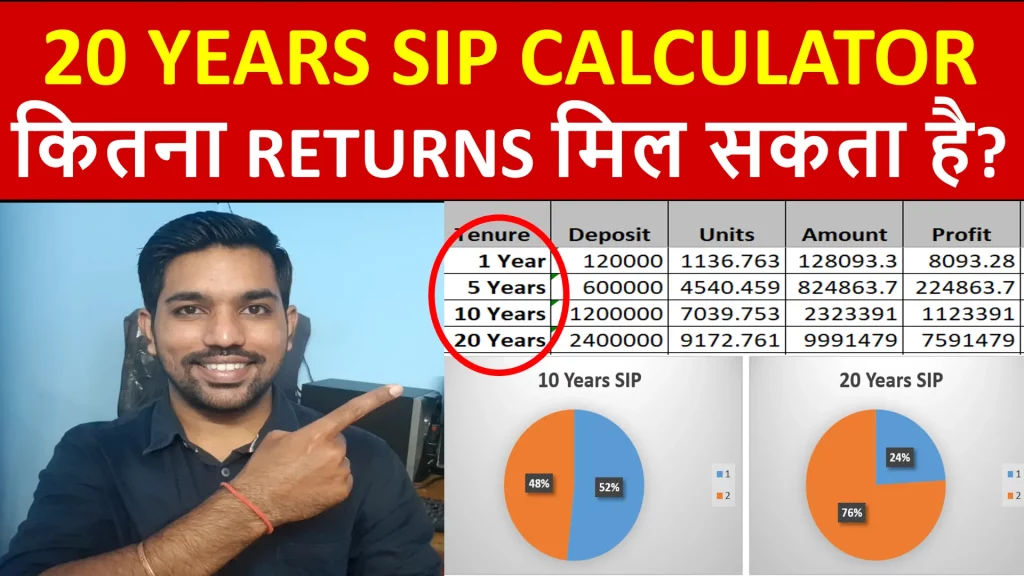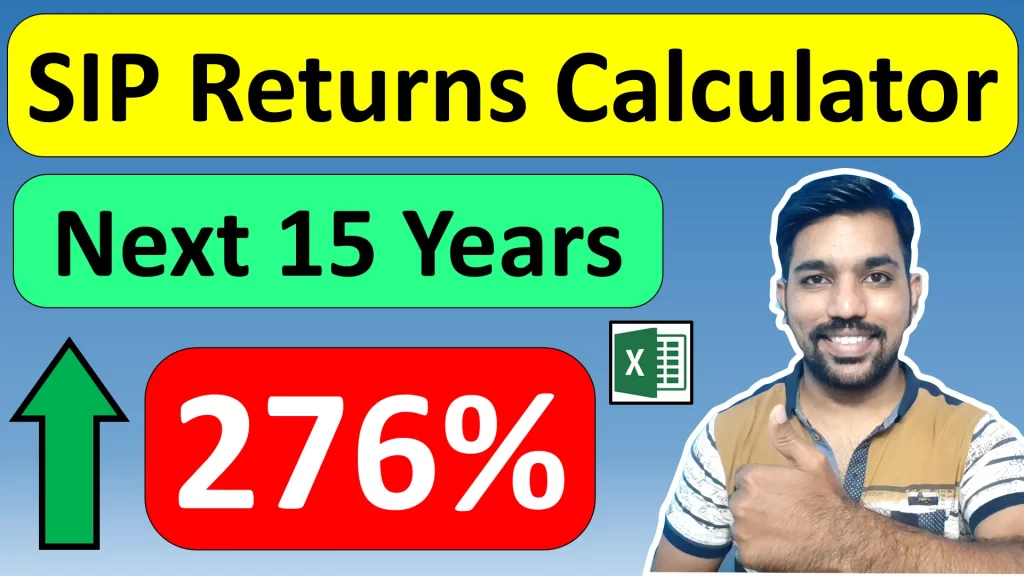Equity Mutual Funds are the type of mutual funds that invest in stocks or shares of the companies. They have multiple stocks in their basket due to which, returns from all the stocks of the companies are consolidated and the return of Equity Mutual Fund is calculated. This reduces the risk of investing in just one company’s stock. Equity Mutual Funds have fund manager allocated, who takes the decision of selecting the stocks. At least 60% of the total funds invested must be in equity to call it as Equity Mutual Fund, and the remaining amount can be in debt or money market instruments.
Let us understand Equity Mutual Funds in more detail.
- What is Equity Mutual Funds?
- How Equity Mutual Funds work?
- Features and Benefits of Equity Mutual Funds
- Who should invest in Equity Mutual Funds
- Types of Equity Mutual Funds
- Ways to invest in Equity Mutual Funds
- What are some good Equity Mutual Funds
- Equity Mutual Fund Returns Calculation Video
- Conclusion
- Frequently Asked Questions
What is Equity Mutual Funds?
- Mutual fund contains list of stocks in which it invests it’s assets (money) collected from investors. In return, the mutual fund tries to maximize returns of investors
- Equity Mutual Fund is one of the types of mutual funds that invest in equities or stocks of the companies
- It is classified as Equity Mutual Funds, since at least 60% of the total assets must be invested in equities or stocks of the companies
- The remaining amount can be invested in debt or money market instruments to fulfill the need of redemptions made by investors
- Equity Mutual Funds are risky in nature since they invest in stocks of companies. this risk is directly proportional to the amount of money allocated to equities of companies
- Mutual Fund with 90% allocation to equities (stocks) will be more risky compared to the mutual fund with 65% of allocation to equities in their portfolio
- Mutual funds are allocated with fund manager to select equities or stocks of companies to maximize returns on your investments
- Every mutual fund has an associated cost called as expense ratio, which is capped at 2.5% by SEBI. This expense ratio is the cost of handling your invested amount by fund manager and team, to maximize your returns on invested amount
- Expense ratio of funds that buy and sell more frequently will have high expense ratio compared to other funds that buy and sell less frequently while holding the stocks for long period
ALSO READ: Rs. 1000 Equity Mutual Fund Returns Calculation
How Equity Mutual Funds work?
The working of Equity Mutual Funds is quite simple:
- You invest the lump sum or SIP amount in an Equity Mutual Fund of your choice
- The fund manager after his / her analysis will allocate the total assets collected from all investors in equities and debt instruments
- Equity Mutual Funds should at least have 60% of the total assets being allocated to equities of the companies
- The remaining amount can be invested in debt or money market instruments to fulfill the redemptions of the investors
Number of Units = Investment Amount / NAV- Out of this Rs. 2000, your investment amount was Rs. 1000, so you made profits of Rs. 1000
- You can also invest via SIP (Systematic Investment Plan), in which every month a specific amount is debited from your bank account as per your amount selection and you buy mutual funds to hold for long term in order to achieve your financial goals
ALSO READ: How to Invest in Mutual Funds via SIP
Features and Benefits of Equity Mutual Funds
Let us now understand some important features of Equity Mutual Funds:
Features of Equity Mutual Funds
- Asset Allocation: Equity Mutual Funds are named after their allocation of at least 60% in equities from their total assets. Higher allocation to equities will make them more risky but highly rewarding as well
- Holding Period: It is important to know that since Equity Mutual Funds are little risky in nature compared to other mutual funds, they are highly rewarding as well. You can expect between 10% to 15% average annual returns over long term of 5 years to 7 years. We have even seen some mutual funds provide 20% returns over long term. So you should hold the Equity Mutual Funds over long term to achieve your long term financial goals
- Cost of Investment: Expense ratio is the cost associated to every mutual fund which involves buying and selling of equities, fund manager fees and other similar charges. More frequent buying and selling will result in high expense ratio due to more brokerage charges.
You can also use the SIP calculator to check returns using equity mutual funds:

Let us now understand benefits of Equity Mutual Funds.
Benefits of Equity Mutual Funds
- Money Managed by Experts: Since mutual funds are managed by fund manager, who has lot of experience in stock market and studies before buying and selling of stocks, you are avoiding yourself from making mistakes that you might make while investing in stocks. It is better to give your money to an expert to buy stocks rather than you buying them without any knowledge. But yes if you know how to select stocks to maximize your returns, than you should definitely consider investing by yourself, provided you don’t make losses
- Low Cost: Usually the cost of most of the mutual funds are low compared to when you buy stocks directly using broker. Rs. 20 per transaction is the common pricing these days when you invest directly in stocks by yourself. But it is much lesser, when a fund manager does the same transaction with huge amount for all investors
- Flexibility: You can invest in Equity Mutual Funds via lump sum amount or via SIP in which you invest every month to get rupee cost averaging benefit. So it is quite flexible
- Liquidity: Equity Mutual Funds are liquid in nature and you can get the amount after redemption within 3-4 working days.
Rs. 2000 SIP Returns Calculation in Mutual Fund Video

Watch more Videos on YouTube Channel
Who should invest in Equity Mutual Funds
If you are a beginner and just starting with investing in mutual funds, you can go for large cap mutual funds that are less risky in nature. Large cap mutual funds are funds that invest in large cap companies that have very less chances to go bankrupt. The risk is low and similarly you can get average returns in large cap mutual funds
If you are regular investor, go for mid cap or small cap mutual funds based on market capitalizations, since the mid cap and small cap companies are capable of taking risks to maximize their revenue and profits, thus providing higher returns. These are little more risky compared to large cap mutual funds.
And if you are in 50s or 60s, and want to preserve capital irrespective of short term or long term goals, you should go for debt mutual funds, since they provide consistent returns with very low risk.
Another type of Mutual Fund is Hybrid Mutual fund that helps you to diversify your investments between equities and debt instruments. So if you can take some risk and want returns higher than debt funds, than you can consider Hybrid funds as well.
Types of Equity Mutual Funds
There are various types of Equity Mutual Funds and they can be classified as:
Based on Market Capitalization
Mutual funds based on Market Capitalization depends on which companies they are investing in:
Large Cap Funds: Funds that only invest in Large cap companies, which are top 100 companies in India based on market capitalization.
Mid cap funds: These funds invest in the companies that are between 101 to 250 rank in India based on market capitalization, and have the potential to be included in top 100 companies in India based on their business model and strategy
Small cap funds: These funds invest in companies with rank 250 and above based on market capitalization. These are highly risky in nature but also provide high returns over long term with high volatility
Multi cap Funds: These funds invest across all market capitalizations including large cap, mid cap and small cap companies. They tend to be more risky compared to large cap funds but also provide more returns.
Love Reading Books? Here are some of the Best Books you can Read: (WITH LINKS)
Based on Investment Style
Equity Mutual Funds discussed till now are actively managed mutual funds, which means the fund manager actively manages the fund to buy and sell stocks based on the market conditions and companies quarterly results.
There is another way to invest in mutual funds via Index Mutual Funds. Index Mutual Funds invest in stocks based on the indices – Sensex and Nifty.
Sensex belongs to top 30 companies in BSE (Bombay Stock Exchange) and Nifty belongs to top 50 companies in NSE (National Stock Exchange) based on market capitalization.
So you can choose Index mutual funds as well which is passive in nature and are not actively managed. These funds have low expense ratio.
Based on Sector and Theme
Sector funds meaning similar stocks that belong to either FMCG (Fast moving consumer goods), technology, pharma, etc. These funds invest in stocks of similar companies and that’s why they are riskier in nature.
In case the demand for their products is low in a particular season or if they face some regulatory changes, than all stocks in same industry might go down and result in negative returns.
Also, during good times, they tend to give better returns if the industry is doing good.
Below is the summary of different types of Equity Mutual Funds:
| Fund Type | Description | Risk Level |
|---|---|---|
| Large-Cap Funds | Invest in stable, well-established companies | Low to Medium |
| Mid-Cap Funds | Focus on mid-sized companies with growth potential | Medium |
| Small-Cap Funds | Target small companies with high growth potential | High |
| Multi-Cap Funds | Invest across large, mid, and small-cap stocks | Medium |
| Sectoral/Thematic | Invest in specific sectors or themes like tech or ESG | High |
| ELSS (Tax Saving) | Offers tax benefits with a 3-year lock-in period | Medium |
| Dividend Yield Funds | Focus on dividend-paying stocks | Low to Medium |
| Value Funds | Invest in undervalued stocks | Medium |
| Growth Funds | Target companies with high growth potential | Medium to High |
Ways to invest in Equity Mutual Funds
You can invest in Equity Mutual Funds via 2 ways:
- Lump sum Investing: If you have lump sum amount to invest, you put the entire corpus in mutual fund. This can be little risky if market is at it’s peak. You might get the mutual fund units at high price and in short term, those units might lose some value if market goes down for short term. But lump sum investing is good when market is at it’s low
- SIP (Systematic Investment Plan): In SIP, you invest specific amount every month in selected mutual fund. This helps you to get the benefit of rupee cost averaging, since you are investing regularly irrespective of whether the market is low or high.
Combination of SIP and Lump sum investing over long term can build wealth for you and help you achieve your financial goals without much stress.
ALSO READ: SIP vs SWP which is Right for you
What are some good Equity Mutual Funds
Some of the Good Equity Mutual Funds are:
- HDFC Index Fund Sensex Plan
- Canara Rebeco Bluechip Equity Fund
- Mirae Asset Large Cap Fund
- Motilal Oswal Nifty Midcap 150 Index Fund
- Axis Small Cap Fund
Above funds are some of the good equity mutual funds based on their past performance. Please note that this is not an investment advice and past performance does not guarantee future returns, so consult your financial advisor before taking any decisions on investments.
Equity Mutual Fund Returns Calculation Video
Watch below video to know how returns are calculated in equity mutual fund:

Conclusion
So Equity Mutual Funds help you to invest in equities or stocks of companies to earn you better returns over fixed deposits and other fixed income instruments. At least 60% of the total assets must be allocated to equities to call it as equity mutual fund.
You can invest in large cap, mid cap or small cap equity mutual funds based on your risk appetite and financial goals to be achieved.
Some more Reading:
- Mutual Fund Returns Calculator
- Rs. 5000 SIP Returns in Sensex for 25 Years
- Income Tax on SIP Maturity or Redemption
Frequently Asked Questions
What is equity value mutual fund?
Equity Value mutual fund focuses on investing in undervalued stocks. Instead of directly investing in stocks, you can invest in mutual fund in which fund manager will allocate your invested amount to undervalued stocks to maximize your investment returns.
What is equity index mutual funds?
Equity Index mutual funds invest in Index like Sensex and Nifty which represents the top 30 and top 50 companies in BSE and NSE respectively. Your investment amount is allocated to these top companies only and are not actively managed based on any other events. In case the rankings of any of the companies change, it will reflect in Index mutual fund and the investment allocation will be adjusted accordingly.
Is equity and SIP same?
Equity refers to the stock of the company, that the company want you to buy as investment so that they can maximize your returns while they increase their revenue and profits. On other hand, SIP or Systematic Investment Plan is a way to invest in equities or mutual funds. In SIP you invest in stock or mutual fund every months while the prices go up or down, due to which you get the benefit of averaging the cost over time which we refer to as “Rupee cost averaging”. So equity and SIP are not same!
Which type of equity fund is best?
Large cap equity fund is best if you are a beginner and started to invest recently. Whereas if you are a regular investor, based on your age and long term goals you can choose mid cap or small cap equity funds for better returns.
What is an equity mutual fund?
An equity mutual fund invests at least 65% of its assets in stocks to generate long-term capital growth.
Are equity mutual funds a good investment?
Yes, they offer higher returns than debt funds but come with higher risk. Ideal for long-term goals.
How do equity mutual funds work?
They pool money from investors, invest in stocks, and distribute units. NAV reflects fund performance.
What is NAV in mutual funds?
NAV (Net Asset Value) is the per-unit price of a mutual fund, calculated daily based on total assets minus liabilities.
What are ELSS funds?
Equity Linked Savings Schemes (ELSS) are equity mutual funds that offer tax deductions under Section 80C with a 3-year lock-in.
Save Home Loan Interest Amount!
Use Home Loan Excel Calculator that will help you to Save Interest Amount on Home Loan EMI.
Click below button to download Home Loan EMI and Prepayment Calculator in Excel:
Watch how Home Loan Calculator in Excel Works
Income Tax Calculator App – FinCalC
For Income Tax Calculation on your mobile device, you can Download my Android App “FinCalC” which I have developed for you to make your income tax calculation easy.
What you can do with this mobile App?
- Calculate Income Tax for FY 2025-26 and previous FY 2024-25
- Enter estimated Investments to check income tax with Old and New Tax Regime
- Save income tax details and track regularly
- Know how much to invest more to save income tax
- More calculators including PPF, SIP returns, Savings account interest and lot more

Use Popular Calculators:
- Income Tax Calculator
- Home Loan EMI Calculator
- SIP Calculator
- PPF Calculator
- HRA Calculator
- Step up SIP Calculator
- Savings Account Interest Calculator
- Lump sum Calculator
- FD Calculator
- RD Calculator
- Car Loan EMI Calculator
- Bike Loan EMI Calculator
- Sukanya Samriddhi Calculator
- Provident Fund Calculator
- Senior Citizen Savings Calculator
- NSC Calculator
- Monthly Income Scheme Calculator
- Mahila Samman Savings Calculator
- Systematic Withdrawal Calculator
- CAGR Calculator
I’d love to hear from you if you have any queries about Personal Finance and Money Management.
JOIN Telegram Group and stay updated with latest Personal Finance News and Topics.
Download our Free Android App – FinCalC to Calculate Income Tax and Interest on various small Saving Schemes in India including PPF, NSC, SIP and lot more.
Follow the Blog and Subscribe to YouTube Channel to stay updated about Personal Finance and Money Management topics.









